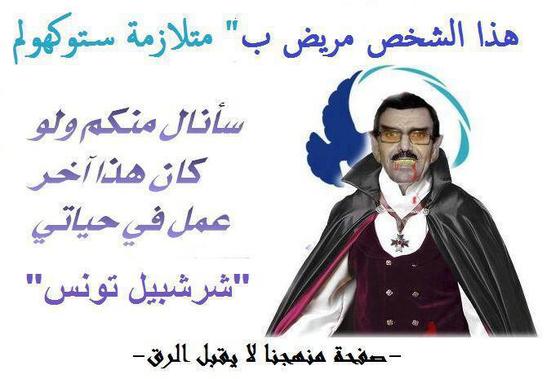Image may be NSFW. Clik here to view.  |
On the same day that Tunisia's prime minister accused Abu Iyad al Tunisi of being "deeply involved" in violence and arms trafficking, Ansar al Sharia Tunisia released this message from its leader threatening the Ennahda government. |
In an interview published by Le Monde on March 26, Tunisian prime minister Ali Larayedh reiterated his criticisms of the Salafi jihadists who have grown stronger throughout his country. Ali Larayedh accused Ansar al Sharia and its leader Seifallah Ben Hassine (a.k.a. Abu Iyad al Tunisi), in particular, of spreading violence. "Abu Iyad is deeply involved in issues of violence and arms trafficking," Larayedh claimed.
Authorities tried to arrest Abu Iyad after the Sept. 14 assault on the US Embassy in Tunis, which he is accused of orchestrating, Larayedh explained. But the Ansar al Sharia leader was surrounded by supporters and bystanders at the Al Fatah mosque in Tunis, making it impossible to arrest him easily. Larayedh claimed that Abu Iyad "fled in disguise."
Within hours of Le Monde's interview being published online, Ansar al Sharia Tunisia's official Facebook page noted the prime minister's comments with disapproval. The group also posted a short message from Abu Iyad that is addressed as an "Urgent Letter to the Wise [Men] of Ennahda."
Abu Iyad first cites a Quranic verse that reads, "Those unto whom men said: Lo! the people have gathered against you, therefore fear them. But (The threat of danger) increased the faith of them and they cried: Allah is Sufficient for us! Most Excellent is He in Whom we trust!"
Directing his ire at Ennahda's leadership, Abu Iyad then warns, "To your wise men we say: Keep your sick [or diseased] ones from us, or we will direct our war against them until their downfall and their meeting with the dustbin of history... Know that we will not delay in saying that the answer is what you see, not what you hear... If you do not rectify your situation."
Abu Iyad's letter can be interpreted as a thinly-veiled condemnation of Ali Larayedh and other Ennahda leaders whom Ansar al Sharia Tunisia finds to be insufficiently pure. Furthermore, Abu Iyad seems to be asking Ennahda's "wise men" to purge its ranks.
Another Facebook page named the Talaba Revolution also posted a link to Larayedh's Le Monde interview along with a picture portraying the prime minister as a vampire. The Talaba Revolution Facebook site is not officially part of Ansar al Sharia Tunisia's online propaganda network, but it does regularly post the group's messages and clearly supports Abu Iyad's agenda.
|
Image may be NSFW. Clik here to view. 
|
The Talaba Revolution Facebook page posted a link to Larayedh's Le Monde interview along with this image portraying him as a vampire. |
Ansar al Sharia Tunisia has previously denounced the prime minister. On its Facebook page earlier this year, the organization posted a video of a television interview with Larayedh shortly after he was charged with forming a new cabinet. "I say it clearly that if the security of the Tunisians today and tomorrow requires detaining [individuals], I will not hesitate," Larayedh said in the video.
Ansar al Sharia took this as a threat and issued a response to Larayedh that read, "And we repeat what Sheikh Abu Iyad, may God protect him, has already said to you: 'Stick to your home and your room, and know your level. I swear by God that even though we do not have material force, our power is derived from God, the Lord of all creation. I swear if you do not learn a lesson from the escaping tyrant [a reference to deposed Tunisian president Zine El Abidine Ben Ali] you will be made a lesson too, just like him.'"
An "inevitable confrontation"
Ali Larayedh has spoken in the past of an "inevitable confrontation" with Tunisia's Salafists, and Le Monde wanted to know if this is still his opinion. "It has already taken place and will continue to occur, on an ad hoc basis," Larayedh said.
There is a Salafist faction "that advocates violence and terrorism," Larayedh continued. "There is no dialogue with those who are at war with society."
Other Salafists "at the moment...do not use violence," Larayedh said, but "we are against their vision of society." He is "confident that Tunisians will not opt for such a project."
Several issues are exacerbating tensions between Larayedh's government and the Salafists, including Abu Iyad's group.
A significant number of Ansar al Sharia Tunisia members were detained after the Sept. 14 assault on the US embassy in Tunis. Salafists were again detained after the assassination of Chokri Belaid, a popular leftist politician, on Feb. 6. It was after Belaid's murder, which rocked Tunisian society, that Larayedh succeeded Hamadi Jebali as prime minister.
During his Le Monde interview, Larayedh said that some "accomplices" of Belaid's murderer have been arrested, and that Tunisian authorities have identified the chief suspect, who remains at-large, as "a man in his thirties." Belaid's assassin "is part of the Salafst movement," Larayedh explained, and "he attends their cultural events and mosques."
Larayedh hinted at the possibility of a deeper conspiracy behind Belaid's death. "But have these men acted alone or on behalf of a group [that is] internal or external to Tunisia?" Larayedh asked rhetorically. "This is what we are now trying to determine."
Another issue increasing tensions is the seizure of arms. "Where are the many weapons seized in recent months in Tunisia?" Le Monde asked. "Since several months ago, the Ministry of Interior has been working on weapons trafficking networks," Larayedh answered. "Violent groups have wanted to benefit from them and have stored these weapons with the idea of using them one day in Tunisia or elsewhere."
Larayedh then offered a potentially ominous observation: "For the moment, there are more weapons seizures than armed actions." It is particularly interesting, given this context, that he accused Abu Iyad of being involved in "arms trafficking."
Another voice weighed in on events inside Tunisia just as the war of words between Larayedh and Abu Iyad was heating up. During an interview aired on Tunisian radio, Gen. Carter Ham, the chief of US Africa Command, said that "it is very clear to me that al Qaeda intends to establish a presence in Tunisia." However, Ham added, the Ennahda government is "committed to doing everything it can to prevent al Qaeda from establishing a presence."
Abu Iyad's Ansar al Sharia Tunisia took note of Ham's comments. In a Facebook posting several hours after the release of Abu Iyad's letter to Ennahda, the group posted a picture of Ham with a caption claiming there will soon be a "US intervention on the pretext of combating terrorism under the auspices of the puppet government."
The "puppet government" is, of course, Larayedh's Ennahda-led coalition.
Abu Iyad al Tunisi has long-standing ties to al Qaeda.
Steve Miller, a research analyst at the Foundation for Defense of Democracies (FDD), and Lisa Lundquist, editor of The Long War Journal, contributed research to this report.